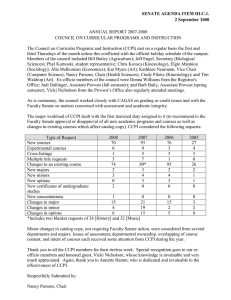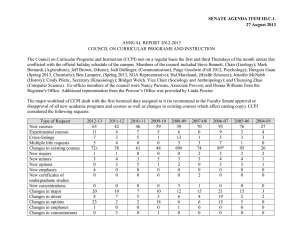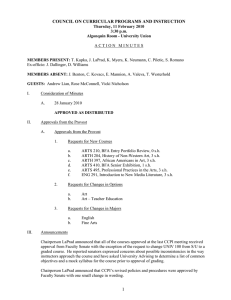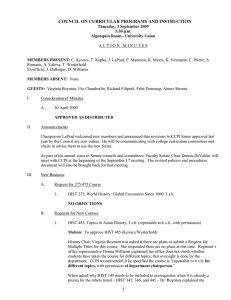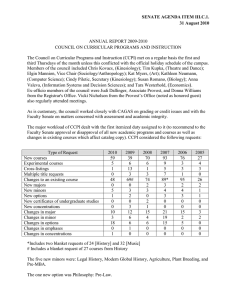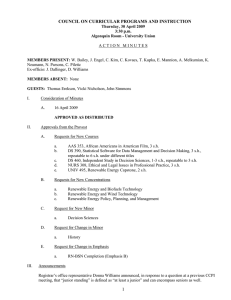COUNCIL ON CURRICULAR PROGRAMS AND INSTRUCTION
advertisement
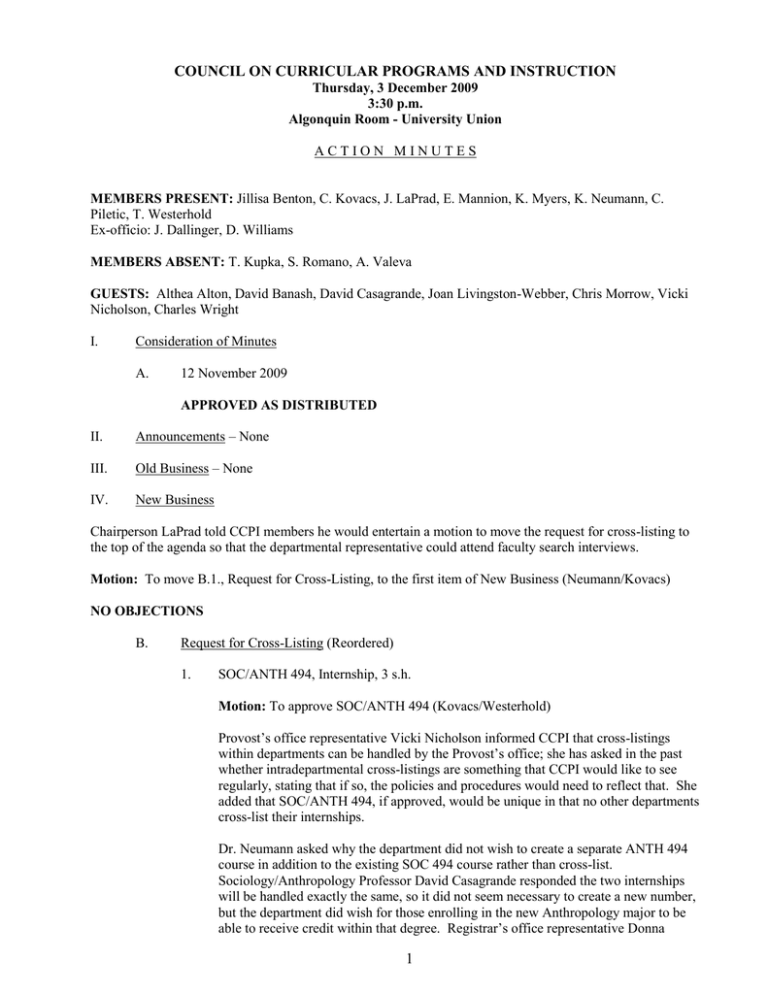
COUNCIL ON CURRICULAR PROGRAMS AND INSTRUCTION Thursday, 3 December 2009 3:30 p.m. Algonquin Room - University Union ACTION MINUTES MEMBERS PRESENT: Jillisa Benton, C. Kovacs, J. LaPrad, E. Mannion, K. Myers, K. Neumann, C. Piletic, T. Westerhold Ex-officio: J. Dallinger, D. Williams MEMBERS ABSENT: T. Kupka, S. Romano, A. Valeva GUESTS: Althea Alton, David Banash, David Casagrande, Joan Livingston-Webber, Chris Morrow, Vicki Nicholson, Charles Wright I. Consideration of Minutes A. 12 November 2009 APPROVED AS DISTRIBUTED II. Announcements – None III. Old Business – None IV. New Business Chairperson LaPrad told CCPI members he would entertain a motion to move the request for cross-listing to the top of the agenda so that the departmental representative could attend faculty search interviews. Motion: To move B.1., Request for Cross-Listing, to the first item of New Business (Neumann/Kovacs) NO OBJECTIONS B. Request for Cross-Listing (Reordered) 1. SOC/ANTH 494, Internship, 3 s.h. Motion: To approve SOC/ANTH 494 (Kovacs/Westerhold) Provost’s office representative Vicki Nicholson informed CCPI that cross-listings within departments can be handled by the Provost’s office; she has asked in the past whether intradepartmental cross-listings are something that CCPI would like to see regularly, stating that if so, the policies and procedures would need to reflect that. She added that SOC/ANTH 494, if approved, would be unique in that no other departments cross-list their internships. Dr. Neumann asked why the department did not wish to create a separate ANTH 494 course in addition to the existing SOC 494 course rather than cross-list. Sociology/Anthropology Professor David Casagrande responded the two internships will be handled exactly the same, so it did not seem necessary to create a new number, but the department did wish for those enrolling in the new Anthropology major to be able to receive credit within that degree. Registrar’s office representative Donna 1 Williams warned that if students need SOC 494 and mistakenly enroll for ANTH 494, or vice versa, there will be no mechanism to prevent them from getting credit for the wrong course for their major. Dr. Neumann asked what the department sees as the advantage to cross-listing its internship. Dr. Casagrande responded the request is highly symbolic; the department is trying to do things to meld Sociology and Anthropology together, adding those involved with the Anthropology major are trying to work as closely as possible with department sociologists. MOTION APPROVED 8 YES – 0 NO – 0 AB A. Requests for New Courses 1. ARTS 210, BFA Entry Portfolio Review, 0 s.h. Motion: To approve ARTS 210 (Kovacs/Westerhold) Chairperson LaPrad asked Arts Department Chair Charles Wright to provide an overview of requested program changes. Dr. Wright explained the Art Department is undergoing accreditation review for their B.A. and B.F.A. options and wish to reflect things learned through the accreditation process and help students complete the program more effectively. He said the review process resulted in proposed creation of several new courses as well as changing existing courses to that an observation courses will be offered each year in order to track students’ progress. Change: Add “Graded S/U only” to catalog description. This course will also need CAGAS approval due to the prerequisite of a minimum 2.5 GPA in the program. MOTION APPROVED WITH CHANGE 7 YES – 0 NO – 1 AB 2. ARTH 284, History of Non-Western Art, 3 s.h. Motion: To approve ARTH 284 (Westerhold/Piletic) This course has also been submitted to the Council for General Education for consideration. MOTION APPROVED 7 YES – 0 NO – 1 AB 3. ARTH 397, African Americans in Art, 3 s.h. Motion: To approve ARTH 397 (Westerhold/Piletic) Ms. Williams pointed out that there is nothing in place through the Registrar’s office to monitor whether students registering for the class have sophomore standing, thus, the department would need to enforce that prerequisite. When asked if the course would be open to African American Studies students, Dr. Wright responded he would love for those students to take the course. He pointed out that African American Studies offers a course in African Americans in the Arts; it is a broader approach to the arts than ARTH 397, which will center upon African American artists. He stated the two courses could not be cross-listed because they do not cover the same information, but he did receive a letter of support from the Interim Chair of the African American Studies Department. 2 Changes: Change abbreviated title to AFRI AM IN ART. Change “consent of instructor” to “permission of instructor” to match other Art curricula in the undergraduate catalog. MOTION APPROVED WITH CHANGES 7 YES – 0 NO – 1 AB 4. ARTS 410, BFA Senior Exhibition, 1 s.h. Motion: To approve ARTS 410 (Westerhold/Piletic) This course will need to have the 2.5 gateway approved by CAGAS before going to Faculty Senate. Change: Change “ART 310” to “ARTS 310” in prerequisites. MOTION APPROVED WITH CHANGE 7 YES – 0 NO – 1 AB 5. ARTS 495, Professional Practices in the Arts, 3 s.h. Motion: To approve ARTS 495 (Kovacs/Myers) Dr. Neumann asked how “researching graduate schools specializing in a variety of art disciplines, identifying jobs available in the visual arts, and understanding the application processes for graduate schools and jobs,” as stated in the course objectives, are considered to be academic content appropriate for a 400-level course. Dr. Wright responded he understands the concerns, but ARTS 495 encompasses what the department is trying to teach its students as part of their future professional practices. He explained many graphic designers leave college without an understanding of how to create a portfolio of work and what types of content should be included in that portfolio. He stated that other disciplines do not have the same portfolio requirements as that for graphic designers. Dr. Neumann suggested that explanation be included in the course objectives. Chairperson LaPrad suggested the three course objectives in question be combined to state professionally what the academic objectives are in these activities. Changes: Rewrite course objectives 4, 5, and 6 to stress the academic importance of the activities. Change the last course objective to read, “understand what is involved in photographing artwork and some what other options are available.” MOTION APPROVED WITH CHANGES 7 YES – 0 NO – 1 AB 6. ENG 291, Introduction to New Media Literature, 3 s.h. Motion: To approve ENG 291 (Myers/Westerhold) Chairperson LaPrad asked about the meaning of “social justice” in the course description, stating this term has a tendency to be overused. English and Journalism Professor David Banash explained all of the department’s 200-level genre courses address the four foundational interpretive approaches to English studies: Forms, Traditions, Social Justice, and Theory and Language. English majors will be required to take at least one course from each category to complete their upper-division 3 requirements. He defined social justice as issues of representation and power. Chairperson LaPrad expressed his appreciation of this definition and suggested it be included in the course objectives. Change: Identify social justice as part of the course objectives since it is specifically included in the course description. MOTION APPROVED WITH CHANGE 8 YES – 0 NO – 0 AB C. Requests for Changes in Course Descriptions Motion: To bundle for approval all requests under IV.C., Requests for Changes in Course Descriptions (Piletic/Kovacs) MOTION APPROVED 8 YES – 0 NO – 0 AB Ms. Nicholson noted that all of the English requests are matched to Illinois Articulation Initiative (IAI) Gen Ed courses; she asked if anything is changing in the courses’ approach to literary meaning and value. Dr. Banash responded there are no changes being proposed that would affect IAI articulation. English and Journalism Professor Chris Morrow explained what is proposed is not so much fundamental changes in the way the courses are taught but involve articulation with different options and electives that can be taken by students. He added the department is working to make its lower division courses closer resemble its upper division courses. Dr. Banash added the courses are still Gen Ed in nature. He related the department spent a year discussing what should guide English as a discipline before coming up with the four fundamental aspects of English studies that are to be embedded in all 200level genre courses. 1. ENG 200, Introduction to Poetry, 3 s.h. Current: Reading and discussion of selected poetry Proposed: Reading and discussion of poetry from around the world, introducing students to selected traditions, questions of social justice, and methods of interpretation. 2. ENG 201, Introduction to Fiction, 3 s.h. Current: Reading and discussion of selected short stories and novels. Proposed: Reading and discussion of prose fiction from around the world, introducing students to selected traditions, questions of social justice, and methods of interpretation. Ms. Nicholson asked if “prose fiction” in the proposed course description for ENG 201 is the same as “short stories and novels” in the existing description; Dr. Banash responded that its meaning is usually, although not always, the same since prose fiction can also, for example, include poetry. He added the topics in ENG 201 are foundational to the discipline, so if a student takes an Introduction to Fiction at the community college level, the Department of English and Journalism would be comfortable signing off on it. 3. ENG 202, Introduction to Drama, 3 s.h. Current: Reading and discussion of selected dramatic masterpieces of various literary periods. Proposed: Reading and discussion of plays from around the world, introducing students to selected traditions, questions of social justice, and methods of interpretation. 4 Chairperson LaPrad expressed concerns from Dr. Kupka, who could not be present but wished to question the usage of “genre” on the ENG 202 request; the request describes Forms as “the study of particular genres, such as poetry, drama, and film.” Dr. Kupka, via email, explained that in theatre, the term refers to classifications such as comedy, tragedy, farce, melodrama, etc. Dr. Morrow stated that those sub-genres will be addressed in an Introduction to Drama course, but because the course deals more widely with Forms, an umbrella term is needed . English and Journalism Chair Joan Livingston-Webber added the discipline may refer to the genre of poetry, for example, but within this genre include such sub-genres as epic or lyric poetry. 4. ENG/BC 290, Introduction to Film, 3 s.h. Current: Development of the film as a major art form in the 20th century, including technical developments and various theoretical and critical approaches (with laboratory) Proposed: Development of films from around the world, introducing students to selected traditions, questions of social justice, and methods of interpretation (with laboratory) CHANGES IN COURSE DESCRIPTIONS APPROVED 8 YES – 0 NO – 0 AB D. Request for Change in Title, Division, and Prerequisites 1. ARTS 001, Junior Portfolio Review, 0 s.h. Current: ARTS 001, Junior Portfolio Review Prereq: ARTS 101, 102, 140, 240; minimum sophomore standing; and a minimum of 2.5 GPA in art Proposed: ARTS 310, BFA Junior Portfolio Review Prereq: “S” grade in ARTS 210 and a minimum of 2.5 GPA in art Motion: To approve ARTS 001 (Mannion/Myers) MOTION APPROVED 8 YES – 0 NO – 0 AB E. Request for Change in Title, Credit Hours, Description, and Prerequisites 1. ARTS 416, Studio Problems in Graphic Design, 3 s.h. Current: Studio Problems in Graphic Design, 3 s.h. Concentration on finished products to exhibit learned skills as well as diversification of artwork and portfolio formulation. Prereq: For Graphic Design majors only Proposed: Graphic Design Senior Portfolio, 1 s.h. Development and creation of a portfolio of art works representing the student’s achievements in the major and minor studio areas. Prereq: “S” grade in ARTS 310 and a minimum of 2.5 GPA in art or permission of instructor Motion: To approve ARTS 416 (Piletic/Benton) Dr. Neumann asked at what point something becomes a new course when the title, credit hours, description and prerequisites are all being changed. Art Department Professor and CCPI Member Kat Myers explained the changes to the course description are intended for clarification and to bring it more in line with how the course has been taught over the past few years but do not represent substantive changes; she added the reduction in credit hours is necessary to bring 5 416 more in line with ARTS 410. She explained ARTS 416 is the graphic design version of ARTS 410, BFA Senior Exhibition; is has become through the years more of a portfolio compilation. Art students will be required to take ARTS 495, Professional Practices in the Arts, which will cover the remaining topics that were formerly addressed in ARTS 416 but which will be able to be taken by both Bachelor of Arts and Bachelor of Fine Arts majors. Dr. Wright added the department wished for graphic designers to have their own executive course because they do the same preparation as studio artists. Ms. Williams pointed out that if a student has already taken ARTS 416 for 3 s.h., including information that will now be covered in ARTS 495, some advisement will be necessary. The request will need to be go to CAGAS in order to obtain approval to add a 2.5 GPA prerequisite. MOTION APPROVED 6 YES – 0 NO – 2 AB F. Requests for Changes in Options 1. Art Motion: To approve Art option (Myers/Piletic) Changes: Change existing Open Electives to 0 s.h. and proposed Open Electives to 13 s.h. Change total existing s.h. to 122-123 with a footnote to indicate that 3-6 s.h. of required coursework may count toward the General Education curriculum, allowing student to complete the program in 120 hours. MOTION APPROVED WITH CHANGES 7 YES – 0 NO – 1 AB 2. Art – Teacher Certification Motion: To approve Art – Teacher Certification option (Kovacs/Myers) Changes: Line up semester hours in option columns. Change proposed total option courses to 36 s.h. Change total existing s.h. to 134 and total proposed s.h. to 136, with footnotes to indicate that 3-6 s.h. of required coursework may count toward the General Education curriculum, allowing the existing program to be completed in 128-131 hours and the proposed program to be completed in 130-133 hours. Indicate at the end of the Summary of Changes section the reason for the one semester hour increase. Replace bullet #2 in Summary of Changes section with “ARTS 246, Digital Art Photography I, or IDT 240, Photography, can now be used.” MOTION APPROVED WITH CHANGES 7 YES – 0 NO – 1 AB 3. Liberal Arts and Sciences – Paired Minors Emphasis Motion: To approve Liberal Arts and Sciences – Paired Minors option (Piletic/Benton) Ms. Williams pointed out that Functional Morphology is being added because it did not exist when the Liberal Arts and Sciences program was established. Liberal Arts and Sciences Coordinator Althea Alton told CCPI that more than half of the undergraduates in the major are from the Quad Cities so that is an important component because it is accessible to them. Associate Provost Dallinger asked for an explanation of the nature of 6 the Liberal Arts and Sciences categories. Dr. Alton replied that the intention was to resist labeling the categories into Humanities, Social Sciences, etc. so that students would expand their thinking; she said the categories were determined by eight individuals from different disciplines. Dr. Banash, who participated in creating the program, explained the categories were intended so that students when pairing minors did not combine the same types of learning so that there is greater scope; he added the categories may not seem to make sense, but they force students to choose from a variety of disciplines. MOTION APPROVED 7 YES – 0 NO – 1 AB G. Request for Change in Minor 1. English Ms. Nicholson informed CCPI that the changes proposed are minor ones that can be handled directly by the Provost’s office. This request will not need to go forward to Faculty Senate. H. Request for Change in Major 1. English Motion: To approve English change in major (Benton/Mannion) Chairperson LaPrad read the definition of an option as recommended by Faculty Senate to President Goldfarb on November 17: “For majors that have options, the core requirement shall be met as follows: a) non-comprehensive majors will have at least 9 s.h. of unique, invariant, required courses; and b) comprehensive majors will have at least 12 s.h. of unique, invariant, required courses. All options within a single major will have the same core.” Dr. Banash reminded CCPI that the paperwork for the request affecting Options A and B was sent before the recommendation was made by Faculty Senate. He informed CCPI the department has talked, conceptualized, and thought about its core at length; he believes to require them to add a required course to their existing 6 s.h. core would represent a bureaucratic decision rather than a disciplinary one. Dr. Banash stated, however, that if CCPI were to require English to add a course to their core, they would be willing to compromise and add Introduction to Poetry because the department has found that students are less apt to choose to take that course when not required to do so. CCPI representatives agreed to this compromise, thus providing English with a 9 s.h. core and a choice of two additional courses. Changes: Reverse a. and b. within the Proposed Core Courses section. Choose two rather than three of the courses within b. since ENG 200 is repeated in a. Add ENG 200 to required core courses. Revised Proposed Core Courses section should read, “a) Take ENG 200#, ENG 299, ENG 476. b) Choose two of the following: ENG 201#, ENG 202#, ENG 290#, ENG 291*” Change total existing semester hours for Option B to 130 with a footnote explaining that 3-6 s.h. of required coursework may count toward Gen Ed requirements, allowing students to complete the program in 130 s.h. Make changes to the narrative within the Rationale section specifying that students may complete the program through a 9 s.h. combination of ENG 200, 299, or 476, with the choice of an additional two courses from ENG 201, 202, 290, or 291. 7 MOTION APPROVED WITH CHANGES 7 YES – 0 NO – 0 AB 2. Fine Arts Motion: To approve change in Fine Arts major (Kovacs/Mannion) CCPI discussed with Art representatives the nature of open electives, explaining that programs with hours above 120 do not have room to include them. Ms. Williams asked if flexibility in programs is required for National Association of Schools of Art and Design (NASAD) accreditation; Dr. Wright responded that NASAD would like for students to have electives but does not require it. Changes: Move Open Studio Electives from the Existing Open Electives section to the Existing Directed Electives section. Change total existing directed electives to 51 s.h. Move Departmental Studio Electives from the Proposed Open Electives section to the Proposed Directed Electives section. Change total proposed directed electives to 52 s.h. Change total existing s.h. to 121 and total proposed s.h. to 125, with footnotes indicating that 3-6 s.h. of required coursework may count toward the University General Education curriculum, allowing students to complete the existing and proposed programs in 120 s.h. MOTION APPROVED WITH CHANGES 5 YES – 0 NO – 2 AB IV. Reports A. Provost’s Report Associate Provost Dallinger announced that, effective November 30, new options and concentrations will be required to submit feasibility studies to the Provost before moving forward to CCPI and Faculty Senate. Previously, feasibility studies have only been required for new degrees, majors, and certificate programs. Associate Provost Dallinger stated that a feasibility study will not be required for the proposed Philosophy Pre-Law option because it has already been submitted to CCPI, so is already in process. She referred to the motion approved by Faculty Senate at its December 1 meeting which states that “Departments and programs may create prelaw motions,” and to the Provost’s statement at the meeting in support of Philosophy’s Pre-Law option. Dr. Neumann stated that while she applauds the Provost’s decision to require feasibility studies for options, she foresees problems with allowing Philosophy to go forward without one. Associate Provost Dallinger pointed out that there has been no attempt to make International Studies submit a feasibility study after they began the process of going before CCPI and having their request tabled, which is the same situation as Philosophy Pre-Law. Dr. Piletic pointed out that CCPI expects to see a number of pre-law options from many departments; she believes all of the pre-law options should have to go through the same process. The Women’s Studies minor has been approved to be offered at WIUQC. The Bachelor of Science in Telecommunications Management has been approved to change its name to the Bachelor of Arts in Network Technology. 8 Motion: To adjourn (Piletic) The Council adjourned at 5:40 p.m. Cindy Piletic, Secretary Annette Hamm, Faculty Senate Recording Secretary 9
